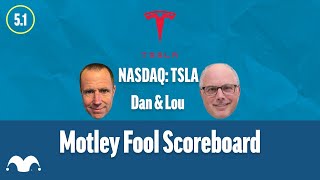Editor's Note: A prior version of this article appeared which overstated the impact of the $7,500 tax credit on electric vehicles. The Fool regrets the error.
Elon Musk hates it when the government picks winners and losers, unless he's the one getting the prize.
The South African-born founder of Tesla Motors (TSLA +3.47%), SolarCity (SCTY +0.00%), and Space Exploration Technologies (that's SpaceX to you) is on a PR crusade against New Jersey Gov. Chris Christie, whose support of that state's auto-dealership regulations predictably clashes with Musk's desire to forge boldly ahead in the rough-and-tumble world of unfettered free-market capitalism:
[T]he Administration and the [New Jersey Motor Vehicle Commission] are thwarting the Legislature and going beyond their authority to implement the state's laws at the behest of a special interest group looking to protect its monopoly at the expense of New Jersey consumers. This is an affront to the very concept of a free market [emphasis added].
But what does Elon Musk really know about competing in a "free" market, anyway? Since the PayPal buyout in 2002, Musk has founded three companies: a rocket builder (SpaceX), an electric-car company (Tesla), and a solar-panel installer (SolarCity). Eagle-eyed readers might recognize a common thread among these three enterprises -- all of them have been largely or entirely dependent on government support.

Elon Musk and President Barack Obama tour a SpaceX facility at Cape Canaveral.
Source: NASA employee Bill Ingalls.
SpaceX's claim to be a "commercial" spaceflight company holds no water when one examines the company's sources of funding. With $1.3 billion in completed government contracts (the company's contracts with NASA alone already hold options that top out at $3.1 billion) following an early NASA cash infusion that exceeded the combined contribution of all private investors (SpaceX's private funding is listed as $245 million on CrunchBase; NASA's first development contract totaled $278 million and only required testing, not successful launches), SpaceX far more closely resembles an arm of the government than a truly independent venture.
Tesla, likewise, took in more money from the government than it ever raised from private sources. CrunchBase records $278 million in pre-IPO funding for Tesla, which was dwarfed in 2009 by a highly public government loan of $465 million. This government loan, incidentally, came less than a year after Tesla was forced to lay off much of its workforce and former R&D director Peter Zhou anonymously revealed that the company had only $9 million in the bank, in the process telling Valleywag that he could no longer "conscientiously be a bystander ... and allow my company to deceive the public and defraud our dear customers."

Source: Steve Jurvetson via Flickr.
Could Tesla have survived without Uncle Sam's helping hand? It's possible, and the company has paid its loan off well ahead of time, but it's easy to see why Musk preferred taking the government's money when you consider that the alternative -- raising venture capital -- would have diluted his stake. Considering that Musk's Tesla stock is now worth about $6.5 billion, the difference between taking government money and raising venture capital has probably been worth at least a billion dollars to him, if not more.
There is also the case of tax credits. Many of the 27,600 cars sold by Tesla has been the beneficiary of a $7,500 plug-in vehicle tax credit, which has given Tesla an indirect consumer-targeted government subsidy of more than $200 million by reducing the cars' true purchase price. The sale of zero-emission vehicle credits -- a state-level subsidy offered by 12 states, including New Jersey -- to other automakers has netted Tesla about $250 million since 2009. All told, the government's direct and indirect support of Tesla adds up to more than $900 million, a figure that lines up rather nicely with the company's cumulative capital expenditures of $818 million since 2009.
SolarCity, too, is hugely dependent on government support. On its website, the company eagerly touts the benefit of tax credits and rebates, which it claims can save homeowners up to 50% on their installation costs. SolarCity can count on at least 30% in federal tax credits for virtually all of its installations, which means that the company has received roughly $110 million in indirect subsidies in addition to its direct government funding, based on lifetime reported revenue of about $370 million. The tax credits apparently aren't enough for SolarCity, which jumped into a legal fight with the federal government last year by alleging that grants it's received -- which now add up to $422 million -- are less than it asked for. SolarCity told The Wall Street Journal last May that it should have received $8 million more. Does SolarCity really think that another $8 million would really help? Since 2009, the company has bled out at least $1.2 billion in negative cash flow, and since it recently delayed its 10-K filing, that number could jump again when last year's final results come in.

Source: User BrokenSphere via Wikimedia Commons.
Add the numbers up: $3 billion. That's how much money Elon Musk's three companies have received in direct and indirect government support over the years. Let's not even begin to count up the money the government (in the United States and elsewhere) has poured into research on spaceflight, batteries, and solar energy, to say nothing of the billions of tax dollars spent to promote electric cars and solar panels with the public.
Two years ago, Musk told the Los Angeles Times:
Government isn't that good at rapid advancement of technology. It tends to be better at funding basic research. To have things take off, you've got to have commercial companies do it.
That's a nice sentiment, and it's certainly a popular one among the Silicon Valley circles Musk travels in, but it doesn't seem to match up to the reality of Musk's business models. Not only has government funding given Musk a technological base to build on, it continues to give him a tremendous amount of financial support across three separate companies.






